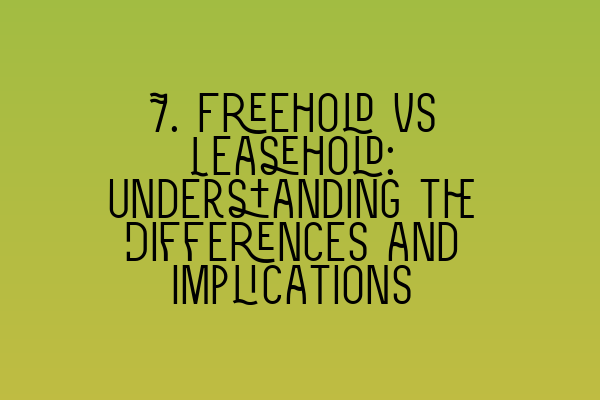Freehold vs Leasehold: Understanding the Differences and Implications
When it comes to property ownership in the UK, there are two main types to consider: freehold and leasehold. Understanding the differences and implications of these two types of ownership is crucial, whether you are buying a property or looking to invest in real estate.
In this article, we will explore the key distinctions between freehold and leasehold properties, including their legal implications, rights and responsibilities, and how they can affect your overall property ownership experience.
1. What is Freehold?
Freehold ownership essentially means that you own the property and the land it stands on outright. You have full and permanent ownership with no time limit. As a freeholder, you have complete control over the property and are responsible for its maintenance.
2. What is Leasehold?
Leasehold ownership, on the other hand, means that you own the property for a fixed period of time, as specified in the lease agreement. The land itself is owned by someone else, known as the freeholder or landlord. Leasehold properties are typically flats or apartments, but they can also include houses.
3. Lease Term and Renewal
Leasehold properties come with a lease term, usually set for a specific number of years. The length of the lease can vary greatly, from as short as 99 years to as long as 999 years.
It’s important to note that once the lease term reaches zero, the ownership of the property reverts back to the freeholder. However, leaseholders often have the right to extend their lease, subject to certain conditions and payment of a premium to the freeholder.
If you are considering buying a leasehold property, it’s crucial to be aware of the remaining lease term and any potential costs associated with lease extension or renewal.
4. Ground Rent and Service Charges
Leasehold properties typically require leaseholders to pay ground rent and service charges to the freeholder or management company. Ground rent is a fixed sum of money paid annually to the freeholder, and service charges cover the cost of maintaining communal areas and providing services such as building insurance.
It’s important to carefully review the terms of your lease agreement to understand the ground rent and service charge obligations. These costs can vary significantly and may increase over time, so it’s essential to budget for them accordingly.
5. Restrictions and Responsibilities
Leasehold properties often come with certain restrictions and responsibilities that freehold properties do not have. These may include obtaining permission from the freeholder for alterations or renovations, restrictions on keeping pets, and the requirement to obtain consent for subletting the property.
Additionally, leaseholders may be responsible for paying a share of the freeholder’s costs for major repairs or improvements to the building or estate. It’s important to carefully review the lease agreement and seek legal advice if you have any concerns or questions about your rights and obligations as a leaseholder.
6. Selling a Freehold or Leasehold Property
The process of selling a freehold property tends to be more straightforward compared to selling a leasehold property. When selling a leasehold property, the buyer will want to ensure that the remaining lease term is sufficient and that there are no outstanding service charge or ground rent arrears.
It’s advisable to engage the services of a specialist property solicitor when selling or buying a leasehold property to ensure all legal requirements are met and to address any potential issues that may arise.
7. Considerations for Buyers and Investors
Whether you are a buyer or an investor, it’s crucial to carefully consider the type of property ownership that best suits your needs.
For buyers, freehold properties offer complete ownership and control, without the need to pay ground rent or service charges. However, freehold properties may be more expensive upfront compared to leasehold properties.
For investors, leasehold properties can provide an opportunity for rental income but require careful consideration of the remaining lease term, potential costs, and future demand for leasehold properties in the area.
In conclusion, understanding the differences and implications of freehold and leasehold ownership is essential when buying or investing in property. Both types of ownership have their pros and cons, and it’s crucial to carefully review the terms and seek expert advice before making any decisions.
At SQE Property Law & Land Law, we offer comprehensive legal services to assist you with your property transactions. Our experienced solicitors can guide you through the complexities of freehold and leasehold ownership, ensuring that your rights are protected and that you make informed decisions. Contact us today for a consultation.
Related Articles:
– SQE 1 Practice Exam Questions
– SQE 1 Practice Mocks FLK1 FLK2
– SQE 2 Preparation Courses
– SQE 1 Preparation Courses
– SRA SQE Exam Dates
